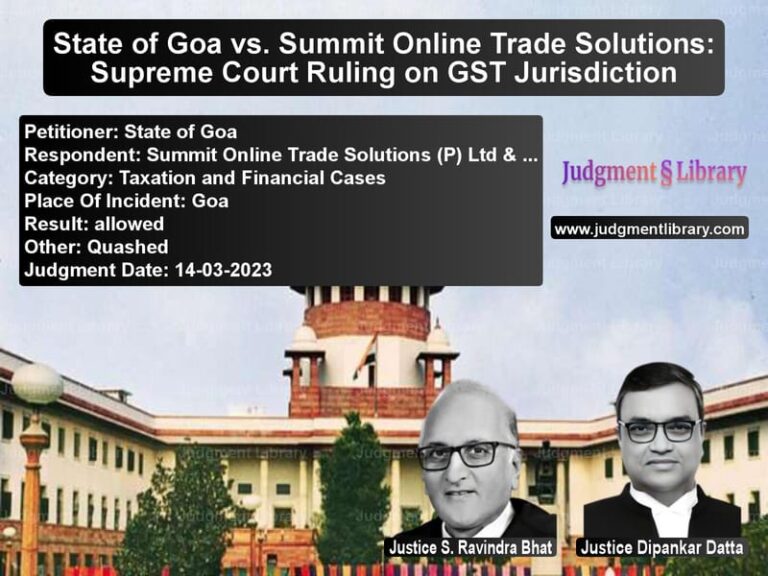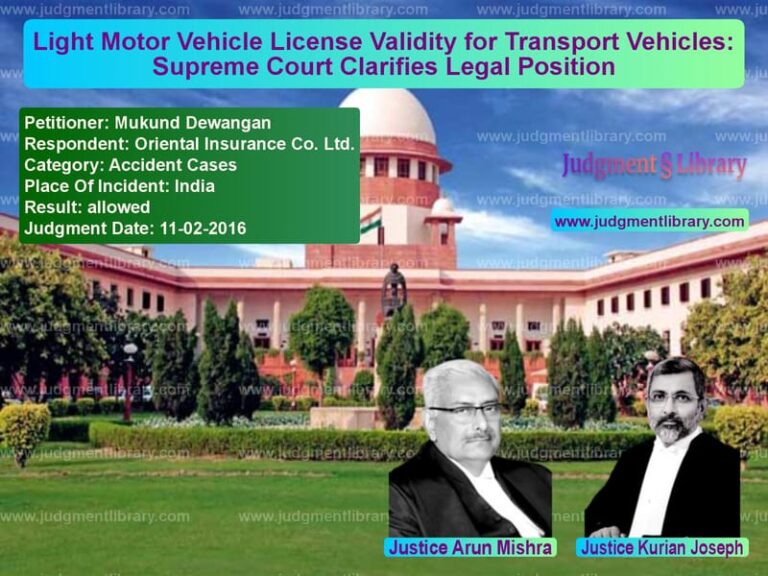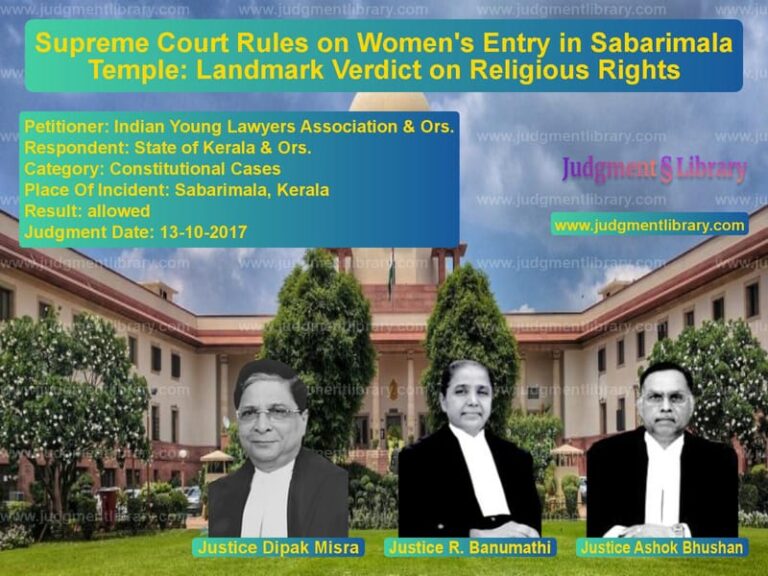Eviction Under Public Premises Act: Supreme Court Directs Civil Suit for Resolution
The case of Western Coalfields Ltd. & Anr. vs. M/s Ballapur Collieries Company & Ors. revolves around the eviction of occupants from public premises under the Public Premises (Eviction of Unauthorized Occupation) Act, 1971. The Supreme Court was called upon to decide whether eviction should be pursued under the summary procedure outlined in the Act or through a civil suit.
The appellants, Western Coalfields Ltd., sought eviction of the respondents, M/s Ballapur Collieries Company, through proceedings before the Estate Officer. The respondents challenged this, arguing that the nature of the dispute required adjudication by a civil court. The Bombay High Court ruled in favor of the respondents, prompting the appeal to the Supreme Court.
Background of the Case
The dispute arose from the initiation of eviction proceedings by Western Coalfields Ltd. against the respondents under the Public Premises Act. The key developments were:
- The appellants claimed that the respondents were unauthorized occupants of the property.
- Proceedings were initiated before the Estate Officer under the summary procedure of the Public Premises Act.
- The respondents contended that complex factual disputes regarding ownership and possession required adjudication by a civil court.
- The Bombay High Court, in Civil Revision Applications Nos. 801 & 803 of 2002, ruled that the matter should be decided by a civil court and not under the Public Premises Act.
- Western Coalfields Ltd. challenged this decision in the Supreme Court.
Legal Issues Considered
The Supreme Court addressed the following key issues:
- Whether eviction proceedings under the Public Premises Act were appropriate in this case.
- Whether the dispute involved complex factual issues that required adjudication by a civil court.
- Whether the Estate Officer had the jurisdiction to decide issues of title and possession.
Arguments by the Appellants
The appellants, Western Coalfields Ltd., argued:
- “The respondents are unauthorized occupants, and their eviction should be handled under the summary procedure of the Public Premises Act.”
- “The Estate Officer has jurisdiction to determine whether the occupation is unauthorized and to issue eviction orders.”
- “Allowing the respondents to challenge the eviction in civil court would defeat the purpose of the Public Premises Act, which is to provide an expedited remedy for public authorities.”
Arguments by the Respondents
The respondents countered:
- “The dispute involves complex questions of title and long-term possession, which cannot be resolved through summary proceedings before the Estate Officer.”
- “The nature of the controversy requires detailed evidence and legal arguments, which are beyond the jurisdiction of the Estate Officer.”
- “The High Court correctly directed the appellants to file a civil suit instead of proceeding under the Public Premises Act.”
Supreme Court’s Observations and Judgment
The Supreme Court, comprising Abhay Manohar Sapre and Indu Malhotra, upheld the High Court’s decision. The Court ruled:
“Having regard to the nature of the controversy and factual issues raised by the parties, the proper remedy for the appellants would be to file a civil suit for eviction instead of taking recourse to summary eviction under the Public Premises Act.”
The Court reasoned that:
- Eviction under the Public Premises Act is meant for cases where unauthorized occupation is clear and undisputed.
- Where there are complex factual issues regarding ownership and long-term possession, a civil suit is the appropriate legal remedy.
- The Estate Officer does not have jurisdiction to adjudicate disputed questions of title.
As a result, the Supreme Court directed the appellants to file a civil suit within six months and ruled that the respondents could not claim that the suit was barred by limitation.
Legal Significance of the Judgment
This ruling has important implications for eviction proceedings under the Public Premises Act:
- Clarifies the scope of summary eviction under the Act.
- Ensures that disputes involving complex factual issues are referred to civil courts.
- Protects the rights of occupants by requiring detailed adjudication in certain cases.
Conclusion
The Supreme Court’s decision establishes that eviction under the Public Premises Act should only be pursued in clear cases of unauthorized occupation. Where disputes involve questions of title and long-standing possession, civil suits provide the appropriate forum for resolution.
Final Verdict: The appeals were dismissed, and the appellants were directed to file a civil suit for eviction.
Petitioner Name: Western Coalfields Ltd. & Anr..Respondent Name: M/s Ballapur Collieries Company & Ors..Judgment By: Justice Abhay Manohar Sapre, Justice Indu Malhotra.Place Of Incident: Maharashtra.Judgment Date: 11-12-2018.
Don’t miss out on the full details! Download the complete judgment in PDF format below and gain valuable insights instantly!
Download Judgment: Western Coalfields L vs Ms Ballapur Collier Supreme Court of India Judgment Dated 11-12-2018.pdf
Direct Downlaod Judgment: Direct downlaod this Judgment
See all petitions in Property Disputes
See all petitions in Landlord-Tenant Disputes
See all petitions in Damages and Compensation
See all petitions in Judgment by Abhay Manohar Sapre
See all petitions in Judgment by Indu Malhotra
See all petitions in dismissed
See all petitions in supreme court of India judgments December 2018
See all petitions in 2018 judgments
See all posts in Civil Cases Category
See all allowed petitions in Civil Cases Category
See all Dismissed petitions in Civil Cases Category
See all partially allowed petitions in Civil Cases Category







